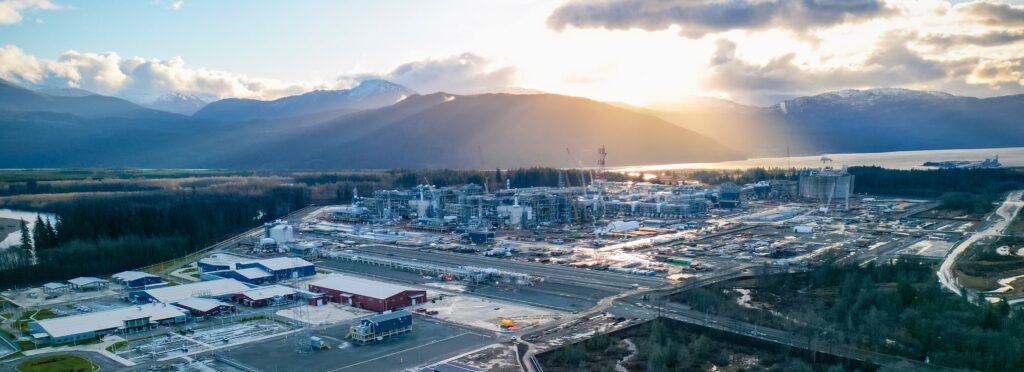
Nearly six years ago, JGC Fluor Joint Venture became the prime contractor responsible for the engineering, procurement, and construction of the LNG Canada Project, which is being built on the traditional territory of Haisla Nation in Kitimat, British Columbia.
At that time, Fluor began leading Indigenous engagement, which was being built on a foundation of strong relationships cultivated by LNG Canada with local Indigenous groups for more than 10 years prior to construction. As the prime contractor, Fluor became the steward of those relationships.
Additionally, Fluor assumed responsibility for delivering on commitments made by LNG Canada through economic and impact benefit agreements as well as compliance related to the regulatory conditions of the Project’s environmental approvals.
For over half a decade, Fluor has been heavily engaged with Haisla Nation and six other local Indigenous groups, including Gitga’at Nation, Gitxaala Nation, Kitselas First Nation, Kitsumkalum Band, Metlakatla First Nation, and Lax Kw’alaams Band as well as the Métis Nation of BC. The focus has been on meaningful consultation and engagement, as well as creating project benefits, all working toward reconciliation. Some of the highlights to date include:
- Consultation and engagement: Extensively consulted local Indigenous groups during the development of major permit applications as well as environmental management plans for construction and operations
- Cultural awareness: More than 40,000 people completed the LNG Canada Cultural Awareness Program, which was developed in consultation with seven local Indigenous groups
- Contracting & procurement: JGC Fluor and its subcontractors spent a total of $2.65 billion on goods and services contracted with Indigenous businesses and joint ventures
- Employment: Average of 390 Indigenous people employed each month (Jan. 2021 to Oct. 2024)
- Training: 34 self-declared Indigenous graduates of JGC Fluor’s Introduction to Industrial Construction Bootcamp from five local First Nations
Meaningful consultation is critical to the success of the Project and for the past six years Fluor has been extensively engaging Haisla Nation’s technical and environmental team on permits, environmental management plans, and other regulatory items. This includes hundreds of hours of two-way information sharing in the form of bi-weekly permitting meetings, topic specific presentations, technical plan reviews, joint meetings with regulators, and mitigation development.
These engagements led to the refinement of many mitigation measures to better protect the environment and resulted in a significant change to the design of the marine outfall for the discharge of treated water into the marine environment to address Haisla Nation’s concerns, based on past experiences with local industries. Fluor’s relationship with Haisla Nation’s technical and environmental team has been built on a foundation of transparency, trust, and mutual respect.
Economic reconciliation is critical for continued progress and development, especially in Canada’s natural resources sector, and the LNG Canada Project is committed to ensuring Indigenous people, communities, and businesses have the opportunity to participate in the Project and benefit from it.
Since January 2019, JGC Fluor spent $2.3 billion on goods and contracted services with Indigenous businesses and joint ventures, and its subcontractors spent $329 million for a combined total of $2.65 billion.
To support Indigenous businesses with successfully bidding contracts, several actions were implemented on the Project, which included:
- Opportunity notices issued each quarter outlining upcoming contracts for bid
- Meetings with Indigenous businesses and their joint venture partners to review the opportunities and answer questions
- Direct access to Fluor’s contract and procurement teams for support with pre-qualification evaluations and bid proposals
- Opportunities for feedback on unsuccessful bids
The LNG Canada Project has employed on average 390 Indigenous people each month for the past three years (note: employment numbers fluctuate with the construction schedule and scopes of work being performed). To facilitate Indigenous employment, priority hiring practices have been implemented across the Project to promote Indigenous hiring, including systems for Indigenous people to self-declare when applying, if they choose.
Fluor’s employment team also maintains close contact with local Indigenous groups’ employment and training departments to share information, identify opportunities, and facilitate connections with its subcontractors. Additionally, an employment opportunities matrix is issued semi-annually to provide a two-year look ahead on employment opportunities across the project site to allow time for Indigenous communities and people to prepare and/or train for the positions.
For those unsure if working on an industrial project was for them, JGC Fluor offered a four-week, free-of-charge Introduction to Industrial Construction bootcamp, designed for participants to learn a variety of trades as an entry into the construction industry. An employment coordinator actively recruited members of local Indigenous groups. Of the 66 graduates from six bootcamps, 34 self-identified as Indigenous and are members of five local First Nations. Many of the graduates pursued additional education in their chosen trade, some were employed on the Project, and others became employed with other local businesses. Regardless of their chosen path following the program, Fluor is thrilled to support local people getting into trades.
While Fluor is proud of what has been accomplished and the positive progress made in the Indigenous space on the Project, Fluor certainly faced challenges along the way. However, the organization remains committed to listening, learning, and continuous improvement.
As an engineering and construction company, historically the measure of success is fulfilling Fluor’s contractional obligations and handing over finished projects to its clients. Fluor has recently adjusted its approach to developing relationships outside of the transactional nature of doing business, based on feedback from Indigenous groups and its commitment to walking the path of reconciliation. This has included hiring a cultural liaison to support cultural needs and initiatives on the project.
Additionally, numerous initiatives have been implemented at the project site, such as the establishment of a spiritual shelter for ceremonial practices, and a blanket exercise facilitated by Haisla Nation, as well as increased participation in community events like the raising of a totem pole at the Haisla Bridge, among many others.
As Fluor nears Phase 1 completion of the LNG Canada Project, the organization is honoured and grateful to have had the opportunity to create real project benefits, build strong relationships, and work with Indigenous groups in a meaningful way. Fluor will take this valuable experience and continue these best practices into how it fosters relationships, conducts business, and builds projects.
Share This:





 CDN NEWS |
CDN NEWS |  US NEWS
US NEWS 


























